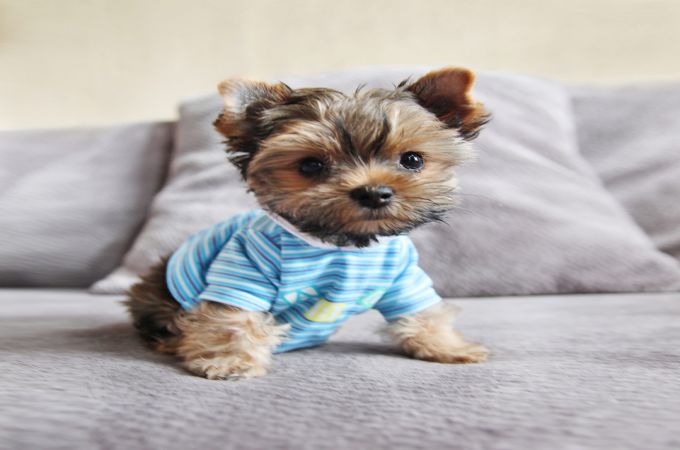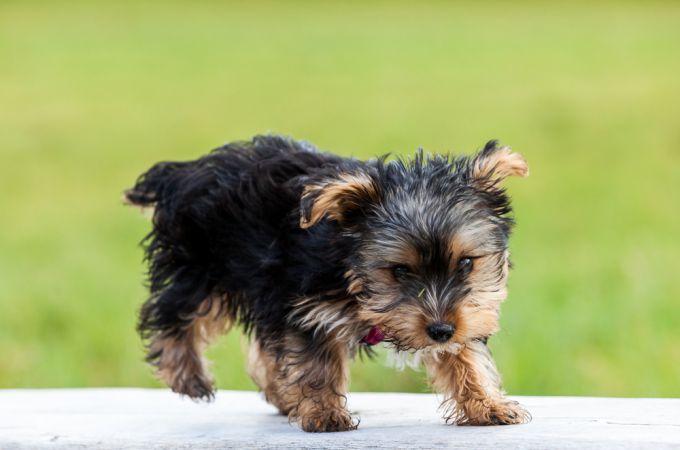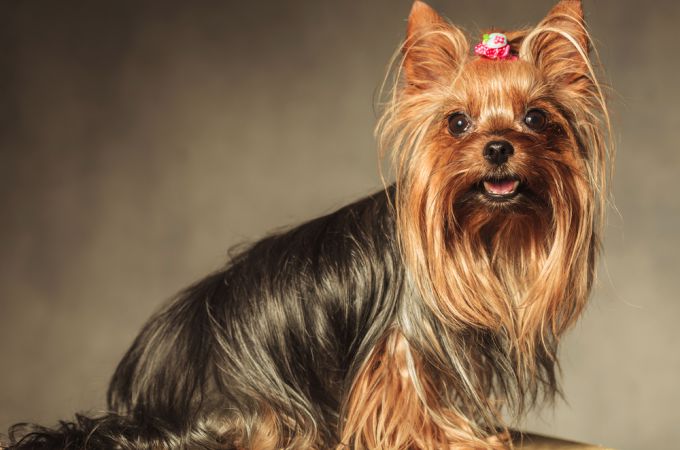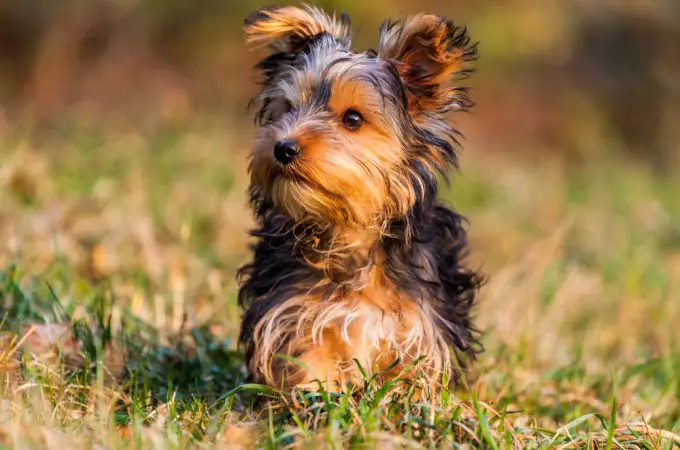As pets, Teacup Yorkie dogs are adorable little tykes. So much do you know about your Yorkie pet in general? Do you know its origins? What is its personality? Do you have the means on how to safeguard the dog from harm? If you want to know more, then the list of Yorkie information below can help you.
Teacup Yorkie Facts
1. It was in England that the Yorkshire Terrier breed first originated. Specifically the region of Yorkshire hence the breed’s name. Originally the Teacup Yorkie was known as the Broken-Haired Scotch Terrier and afterward what the Toy Terrier appeared, marking it as the first Yorkie Teacup dog breeds.
The ancestors of the Yorkie are unknown and lost to time. This lack of sufficient information is due to the original breeders’ lack of breeding records. Without solid proof as to what kinds of dog breeds were used, they are at best speculative. However, three likely Terrier breeds are good candidates for being the ancestor of the Teacup Yorkie dog. These breeds are Skye, Paisley, and Clydesdale.
The original purpose of the Yorkie is to be a rat-catching, aka Ratter. They were very useful in catching rats and other vermin in small places that they tend to hide. Workers found the dogs helpful rat-catching in places like mills and mines. Even hunters saw the value of their abilities and used the dogs for hunting down badgers, foxes and other small-sized animals living in burrows and dens. They are fearless dogs when it comes to going after their hunters’ prey. It is these traits that made the breed famous for people wanting a silky-haired dog.
The most famous Yorkshire Terrier and foundation sire of the Yorkie and Teacup Yorkie breed is called Huddersfield Ben. Huddersfield Ben was owned by a man named M.A.Foster, who gained fame through his Yorkshire Terrier, who won many Ratter contests and more than 70 dog show events. As a stud dog, Huddersfield Ben was famous, and it had a significant impact on developing the Yorkie and Teacup Yorkie breed.
The Yorkie is an English breed that was registered in 1861 under the name “Broken-Haired Scotch Terrier.” However, it was given the official name “Yorkshire Terrier” in 1874
The Yorkie during the Victorian era has become a Companion dog from being a Ratting/Hunting dog. England’s royalty and upper-class folks love the breed for its small size and appearance. England’s royalty and upper-class folks treat the dog much like rich people will treat a Teacup Yorkie dog breed in the modern era. As the dog breed got popular in England, the dog’s popularity soon crossed over to America. As early as 1872, the Yorkie had a toehold in America. By 1878 the American Kennel Club or AKC registered the dog as an official breed.
When the 1940s came, the Yorkie’s popularity has waned. During this time, however, a Yorkshire Terrier named Smoky brought new fame to the breed. Smoky was famous during World War II as a dog hero. American soldier William Wynne found the dog in New Guinea inside a shell hole. She then served in the Pacific with the 5th Air Force. Smoky became part of the troops accompanying them in 12 sea missions and 150 air raids. She contributed some help to the Signal Corps by carrying telegraph wires through a pipe that was 8 inches and 70 feet long. By World War II’s end, Smokey and her owner William Wynne visited many veterans’ hospitals.
MUST-READ: What you need to know about Poodle Yorkie Mix
Today the Yorkie and Teacup Yorkie breeds are still popular with many dog lovers.
2. A Yorkie dog, like any other pet, has its share of health problems. Knowing the problem and how to deal with the problem is essential for the dog. Here is a list of said health issues:
- Collapsing Trachea – As it says in the name, a Teacup Yorkie is prone to having a collapsed trachea due to being fragile and tiny. Regardless of how serious this issue is with the dog, the solution to it is straightforward. Instead of using a collar when walking, the dog uses a harness since it will support the dog’s weight. However, you can combine the collar with the harness.
- Tendon and Ligament Injuries – A Yorkie’s bone structure is quite fragile due to its small size. Occurrences of sprained bones, hip dysplasia, and broken bones tend to happen. These injuries also occur when the dog drops or jumps from a tall height. There is also the possibility of someone accidentally stepping or trodding upon the dog.
- Hypoglycemia – Whenever a blood sugar level goes down quickly, Hypoglycemia Occurs. Mini Yorkie puppies that are 8 to 16 weeks old and adult Yorkies are some of the dog breeds that tend to suffer from Hypoglycemia. If left untreated, it can be fatal to the dog. Fortunately, there are treatments and solutions for Hypoglycemia. Be sure to include some glucose or sugar when feeding your dog to prevent Hypoglycemia from showing its ugly head.
- Patellar luxation – When a dog’s kneecap dislocates from its original position in the dog’s thigh bone, it is called a Patellar luxation. This problem is all-too-common in dogs, especially small breeds like Yorkie dogs. Strangely enough, female dogs have greater chances of having this problem. The cause of Patellar luxation is genetic, traumatic, or congenital. Give your Yorkie some Vitamin C, E, B1, and B6. Add in some essential supplements like omega-3 fatty acids, Glycosaminoglycans, Chondroitin Sulfate, Bioflavonoids and Methylsulfonylmethane (MSM). If the problem becomes severe, take your dog to a veterinarian. It may require some surgery to fix the problem.
- Lack of nutrition – Food is an essential thing to a Yorkie. You may have unintentionally underfed your dog, thus the lack of sufficient nutrients. This oversight (assuming it is) happening is understandable. Since Yorkies need only tiny amounts of food to eat, you may be withholding the rest by thinking that what you feed is enough. If your dog shows signs of drowsiness, erratic or having trouble walking, confusion, fainting and coma (though coma shows up when the situation is dangerous), then your dog needs more nutrients in the dog’s food.
- Sensitivity to temperature changes – A change in weather is a change in temperature and your Yorkie will feel the difference in a negative way. During hot months take precautions to stay in the shade when going out for a walk and give your pet lots of water. A thick sweater and some booties will help the Yorkie adjust to the cold temperature in a cold-weather warm bath.
Be sure to have a regular check-up for your dog to know in advance what ails it. Admittedly you will be spending some money just to maintain your pet, but it will be worth it.
3. A Yorkie Terrier’s lifespan is somewhere around 12 to 15 years. Healthy dogs will live in that period or even beyond it. Health problems such as Collapsing Trachea, Hypoglycemia, Patellar luxation, Tendon and Ligament Injuries can reduce a Yorkie’s lifespan. Inadequate care, improper diet, and willful neglect are also lifespan-reducing factors.
MUST-READ: Different Types of Yorkie Dog Breeds
4. Some people have other names for the Teacup Yorkie dog. Names like Micro Yorkie, Mini Yorkie, and Miniature Yorkies.
Speaking of names, you might plan on registering your pet in the American Kennel Clubs in the future. Please bear in mind that AKC standard registration is only up to 36 characters if you do that. If your dog’s name exceeds more than 50 characters, it will cost an additional $10 for registration.
5. A Full-grown Teacup Yorkie has a height somewhere between 8 and 9 inches. In fact, an 8 and 9 inches tall Yorkie is the official standard height by American Kennel Club or AKC’s standard.
Please remember that any Teacup dog, Yorkie or otherwise, always has the same small height when they reach adulthood. If you got yourself a Teacup breed Yorkie that exceeds the 8 and 9 inches standard of the American Kennel Club, then you got an average Yorkie, not a Teacup.
6. If you’re buying a Yorkie breed, you should know how much Yorkie puppies or adults cost. The price of the dog also depends if there is documentation about the lineage of the dog.
- Yorkies with bloodline documentation – The price tag is around $1200 and $1500 per puppy. It can also go up to $10,000 though puppies with this price tag are from the best elite bloodlines.
- Yorkies without bloodline documentation – The price tag is around $300 and $800 per puppy. Be aware of a lack of bloodline documentation for the puppy; you have little information about the puppy Yorkie. Though it is enticing to buy a cheaper Yorkie puppy, it is neither advisable nor wise. There is a reason why bloodline documentation is necessary. It lets you, the buyer of the puppy, know the lineage history of the Yorkie. It also enables you to know if the puppy is healthy or has a history of illness due to its stud or dame’s lineage. Furthermore, documentation lets you know that the Yorkie puppy is genuine.
7. Food is a significant component of a Yorkie’s health and well-being. What to feed the dog is essential and make sure that the dog food is of top-quality. Due to Yorkies having special dietary needs, you need to consider some points when preparing their food:
- Pay attention to the amount of food you are going to serve the dog. Yorkies have small stomachs that prevent them from eating large meals. Feed the small dog meals several times per day. As for puppies, do the same though you may need to adjust the amount of food as well. Don’t forget to turn the food into bite-size pieces of kibble.
- Small breed and toy dogs require more calories than their large dog counterparts. Make sure that the meal you’re serving has enough calories. You can try buying dog foods for small breed and toy dogs. Don’t give your Yorkie a meal that has too many calories. It can cause overweight.
- If you’re planning on doing a grain-free diet for your Yorkie using grain-free dog foods, then it’s okay. But bear one thing in mind: just because dog food is grain-free doesn’t mean that it is carbohydrate-free. Some carbohydrates are not healthy for your dog, so reading labels before getting one would be wise.
8. There are indeed many coat colorings you can see in various Yorkies. However, the American Kennel Club or AKC recognizes only four colors. These colors are blue and tan, black and tan, black and gold and blue and gold. If your Yorkie is particolored, it is still accepted by the AKC.
Blue of all colors is the dominant coloring you will see in a Yorkie breed. Sometimes black puppies and gold or black and tan will change to blue and tan and blue and gold when they mature. The black color is recessive.
The markings of a Yorkie that is gold or tan may often mix or be delineated with black. The front chest has a blaze or white star marking. As for the skull, jaw, paws, and chest, there are significant white markings.
What we call a particolored Yorkie is a dog with only three colors or tri-color. The most common tri-coloring you’ll see is a dog with a tan or gold head with a white body with a mix of black patches. Some Yorkie breeders think that being a particolored Yorkie is an indication of a bloodline that is pure.
Overall the variety of coat colors makes Pictures of Teacup Yorkies more beautiful and adorable.
9. Another thing that endears dog lovers to a Yorkie dog is their winning personality. A Yorkie can be an amusing and playful dog, but each dog has its character. A Teacup Yorkie is intelligent, easy to house train, courageous, energetic, and charming in general terms.
10. So, is this dog a great pet? Yes, of course! If you want a small dog pet that is amusing, playful, charming, brave, intelligent, and full of energy, then this is the companion pet dog for you. Yes, you will have responsibilities in caring for the health and well-being of a Yorkie, but it can be a fun responsibility with your new cute canine companion.
That’s the information about what a Yorkie is and how you should treat it. The dog will return the love, affection, and attention you lavish on a Teacup Yorkie. After all, any dog lover will enjoy this beautiful small and adorable dog.
MUST-READ: Best Yorkie Names





I love Yorkies and would love to have one. I didn’t realize that there were this many health concerns that I should be aware of. When I get one I will make sure to take it to the vet regularly to keep a tab on these things. Are there foods that will provide them with the vitamins and supplements you suggest, or will I need to get a pill to give him?
you dont need to give him pills but give him regular snoop dog food XD TROLLED
Yes, it would be nice to get Yorkies from a reputable Breeder but they can’t guarantee your dog’s health, though it will be a lot safer to go through that path. I had a dog who died at an early age due to a lot of illness. He had pancreatitis and died of kidney failure at 7 1/2 yrs. it started at age 4. It’s very costly and heartbreaking. I also had a Yorkie who died of liver stunt at age 12. But I have seen Yorkies who have been so healthy all their lives. All I can say, it’s all but luck. My advise, feed them high quality food, get plenty of exercise and be observant. One thing you have to watch for is when they start to drink a lot and urinate often. That is what I’ve noticed from my 2 Yorkies. Last, get pet insurance. It’s worth it. Yorkies are so adorable. It hurts when they leave.
Even buying a Yorkie from the most reputable breeder does not guarantee that it will be healthy. There are too much factors that are involved in it.
We can not say that Yorkshire terriers have bad health. They are like every other dog. The only difference is that they are too tiny and fragile and as soon as some illness is present we have to take immediate actions.
Some people make the mistake to wait too long until they consult with a vet or take some advises from friends that are not appropriate. Those are fatal mistakes in some cases.
The most important thing for rising a healthy Yorkie is feeding him with the highest quality food. Also, regular walks outside very important.
I love Yorkies and would love to have one. I didn’t realize that there were this many health concerns that I should be aware of. When I get one I will make sure to take it to the vet regularly to keep a tab on these things
I love yorkies so much
When I get one I will make sure to take it to the vet regularly to keep a tab on these things. Are there foods that will provide them with the vitamins and supplements you suggest, or will I need to get a pill to give him?
Just got a yorkypoo, she is adorable. Funny smart fun, fast running. Digs , sweet, affectionate, want to be near you all the time. Love her!!!!
When they say to feed them four small meals, just how much is that? If wet food ….would it be four-teaspoon size meals or four-tablespoon size meals? And with hard food the same thing……… give them a teaspoon of hard kibble-four times a day or a tablespoon? And how can you tell if they are hypoglycemic ? What are the symptoms?